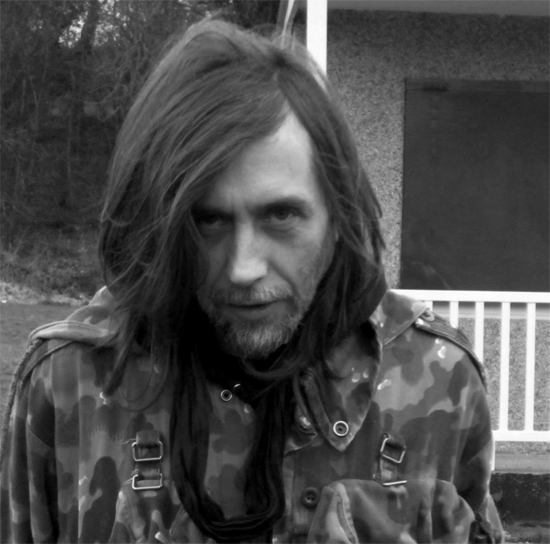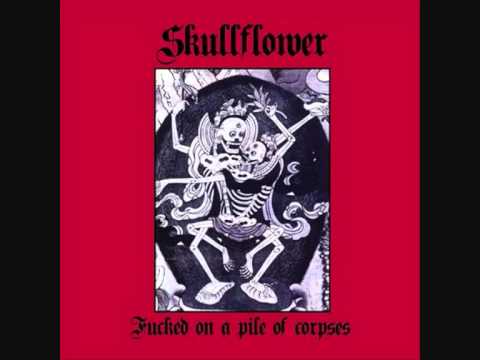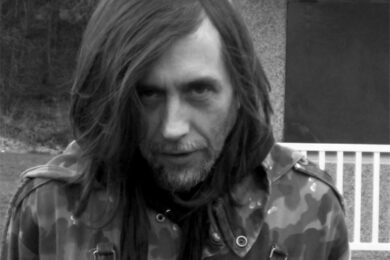For nearly three decades Skullflower has been lurking at the periphery of British rock music, a darkly beautiful shadow that emerged in the heyday of Power Electronics – and even debuted on that scene’s most illustrious and ambitious label, Broken Flag – before traversing metal, free rock and noise to wash up, still roaring and soaring, on the shore of the 21st century underground. Driven by erstwhile Sunroof!, Total and Voltigeurs head honcho Matthew Bower, Skullflower has seen many changes in both personnel and musical styles, but always remained true to an ethos that combined elegiac majesty with unrelenting power. As their name suggests.
This year saw the release of Fucked On A Pile Of Corpses on Cold Spring and it may just be the most extreme album under the Skullflower moniker in years. Overtly referencing the band’s past as a pioneer of both electronic noise and extreme metal, whilst also looking forwards and embracing the modern Harsh Noise Walls scene (that in itself owes much to Skullflower’s trailblazing), Fucked On A Pile Of Corpses is a potent reminder that, whilst decades may have passed since his 1988 Broken Flag debut, Birthdeath, Matthew Bower’s uniquely refusenik spirit and sense of adventure remain undimmed.
The Quietus caught up with Bower to get the lowdown on Fucked On A Pile Of Corpses as well as the band’s unique history and remarkable evolution.
You’ve just launched a new website/blog. Is that’s shaping up ok?
Matthew Bower: Don’t get me started, I can’t look at it at the library for some reason, but I’m sure it’s fine. I think I’m going to have get the Internet at home to work on it.
Are you not a fan of the Internet?
MB: It’s a bit of a double-edged sword (laughs). I’m rather leaning towards the negative camp…
Fucked on a Pile of Corpses is the latest in a veritable torrent of albums, both studio and live, you’ve released in the last 5 or 6 years, coming less than a year after the two discs of Strange Keys to Untune Gods Firmament. Seems like you pretty much live in the studio, though I assume you record at home. Do you find it easy to keep the inspiration and ideas flowing, to keep coming up with new things to record?
MB: I’ve recorded at home, on and off, forever, really. It’s certainly the main method of recording since about 2006, so around the time of Tribulation.
It’s a totally natural speed to work at. I’m essentially a one-man act, so it’s probably problematic to compare me to a band that consists of people who need to get together to make an album. But I don’t analyse how I record. Most of the time, I’ve been working a full-time job, which I’m not doing at the moment, so to be fair, I’m not having to make up for time that may have been taken away from me. I used to have to force myself to be as productive as possible, whereas now it’s very natural. But the whip’s never had to be cracked hard.
I don’t really have inspiration. I generally just start working and figure out what I’m going to do. I might plug in with no more intent than somebody who’s just picked up to just practise. I don’t play without having the means to record if I feel like it.
A lot of your albums have a consistency of sound or a theme. Do you start with an idea of where an album’s going to go, or do you let it evolve organically?
MB: I let it evolve organically. I might have an idea, but I don’t think I’ve successfully straight-ahead converted an idea into actuality, it’s always just been a starting point, and it’s usually forgotten immediately and turned into something different.
How does that work in terms of the different acts you’re involved with, either Voltigeurs or Skullflower? Do you know when you start recording whether it’s going to be a Voltigeurs or Skullflower album?
MB: I only have Voltigeurs and Skullflower at the moment. Usually, when I’m playing with Samantha (Davies), we’ll focus on Voltigeurs, and if I’m working alone it usually becomes Skullflower. And I record live, so that would divide that, really. They’re getting a little blurred, perhaps, when we start doing some overdubbing.
Voltigeurs is really centred very much on the guitar sound, whilst Skullflower, which is also a guitar band, includes a lot of electronic elements, especially on Fucked on a Pile of Corpses, notably on the opening track. Again, was that just a natural decision to add those elements?
MB: Between the monolithic expanse of the triple and double Skullflower CDs [Circulus Vitiosus Deus and Strange Keys to Untune God’s Firmament], which are probably 95% guitar, it just made sense to move around a little. Fucked on a Pile of Corpses had a very strange germination, a lot of shapes before it assumed its final shape. The inputs are very diverse, and a few tracks are a few years old, but it all sounds very similar because I re-processed everything with a similar set-up, which gives it a kind of homogenisation. It became like a row of pictures that had all been treated in the same way. So they may be a bit more disparate than usual, but they’re all held together by the same kind of sound.
It’s probably one of your most diverse albums. Was that a deliberate attempt or something that developed as the album evolved?
MB: I started working on Fucked… using Samantha’s eight-track reel-to-reel, rather than my four-track, with her engineering, and did about four pieces that are represented in the bits towards the end of the album: ‘Tantric Ass Rape’ and ‘Fairy Knife Hell’ are both from those pieces. At that point, I started dragging in some old pieces, rough rehearsal pieces, to make it a kind of collage with those whilst at the same time doing the extra treatments.
The styles that are there are all things I’ve worked with in the past. I think track three was started a couple of years before. And it became apparent that it was close to the kind of Power Electronics stuff I did in Total years ago. And I really liked that…
Fucked on a Pile of Corpses has been promoted as your most extreme album yet. Would you agree?
MB: I’m afraid I’m actually guilty of writing the press release! There’s no great store to put by it. I was asked if I would do it, I thought I’d do a bit of a parody, a sort of Now That’s What I Call Music! 23 (laughs). “THE BEST ALBUM EVER!!” sort of thing. I’m happy to go with it, but it’s really more of a little provocation or something than a true statement of intent.
At the same time, the sheer volume of Skullflower has always been a key factor. Do you see brutality and volume as having a blissful effect, for listeners and for you as a performer?
MB: That gets you part of the way there, yes. There are a lot of comparables, but there’s an idea of something meditational taking place, and of being able to empty yourself in the music. I’ve always been operating in that sort of area, you know. Sitting under a waterfall.
That’s a good image! In a piece you wrote on your website, you mentioned Georges Bataille, and I’m aware of his philosophies of the God-like being twinned with the baser aspects of human nature. Do you reflect that in the title Fucked on a Pile of Corpses?
MB: I think it does. Some of his texts I find a little bit hard to connect with. But I think he encourages approaching a meditative state where things can happen that are beyond you. I think he approaches an ecstatic level from different angles, be it sexuality or overload or whatever. I think I picked that up early on, but I think there’s a lot of effort needed to understand those ideas. I got re-introduced to Bataille recently, around 2005, reading texts that were in a way shorn of the sexual side and focusing on the ‘God’ notion.
So is there a thematic background to Fucked on a Pile of Corpses?
MB: Yes, yes. It could have gone out under the title Flowerstrewn Charnelground, which means exactly the same thing, but stretching it a little bit. It’s a sort of tantric thing, but being slightly profane with something rather holy. Eros and Thanatos, which is there on the cover. The pictures for the cover are ones I’d had lying around since the mid-80s…
Are they designs you came up with?
MB: No, they’re all things I collected, or things I copied out of books. If you drew a circle, it would go from Japan to Tibet, right to left.
Do you design or have a lot of input on all your album covers?
MB: Well, the early ones, on Broken Flag, I completely did myself. Pre-computer years, so I’d send in artwork to be reproduced. I don’t work for record companies, so I just art direct, sometimes using artists that we bring to the table. Otherwise it’s pretty much all me.
Fucked… is also very short by your standards, about 36 minutes. Again was that a conscious decision to go for a short, sharp kick after the length of Strange Keys…, or did you feel the album just didn’t need to be elaborated on?
MB: It’s certainly the natural length for the album. As I was listening back to what I recorded, I became aware that it worked better as a shorter album, with the top length being about six or seven minutes, as opposed to, say, 20-minute workouts.
When you tour, which you’ve been doing a lot of recently, is each show an improvisation, or do you go in with pre-prepared tracks from an album or rehearsal?
MB: It’s pretty much totally improvised. The ones we do with George (Proctor) drumming, which you saw when we shared the Werewolf Jerusalem bill, usually are made up of the same couple of tracks every time, but I don’t think it really works live that way. Typical Skullflower shows over the last couple of years, with me and Samantha, we usually go for the ‘one piece, one tuning’ set, where we only work out the tuning in advance, to some degree. We work with probably five different tunings, and work with them until we find the right one.
That focus on tuning over actual pieces is really interesting. Are you influenced by ‘just intonation’ and ‘militant tuning’ composers such as LaMonte Young or Tony Conrad?
MB: I’m not sure I’ve ever really ‘got’ just intonation, I’ve never really properly understood it. Those splits are a bit like Freud with his Id and Ego, which I’m not sure really exist in the real world. I think I was more influenced by the idea of LaMonte Young rather than his actual music. By the time I actually heard his music, in my early twenties, I’d already done my first drones, one note/one chord pieces. I had his Well-Tuned Piano album, from the eighties, but only really got into it last year… I always preferred the stuff he was doing in the sixties.
One thing that was important with Skullflower at the beginning is that our tuning was lackadaisical, but I always had a problem with digital tuners, because the problem was that everybody sounds the same. I’d rather exploit the natural out-of-tuneness of my own intuitive tuning. It makes it difficult at times, but at other times it really works.
Skullflower has been through a lot of changes, from your early days when you were almost a metal band, with a drummer and bassist; to the more free-form or relaxed sound you have now. Can you take me through that evolution?
MB: ‘Relaxed’ is an apt term for what we are now. I think we reached our limits of relaxation around the time of Argon, or something like that. It was most similar to what sort of hippy rock becomes in the avant-garde. And I’d always had a wide range of influences, such as free jazz, but which I’m pretty closed to now. In the early days, we’d done the whole Power Electronics thing, and there was this whole American noise-rock scene, which we felt closer to at the time than to the Industrial thing. So we were reclaiming some territory there, in a way.
And then, we got more noisy and freeform, but it’s not going back to the Industrial thing, it’s closer to that seventies, Faust and Can sound, that had been an influence on Skullflower in the eighties. Then we had the hiatus, and I started getting heavily into metal music, and that powered me re-starting the band in the 2000s.
On Fucked…, you have a track called “Anubis Station”, and past tracks and album titles have seemed to evoke various pre-Christian religions, without being simple Pagan revivalism. Is this a reflection of a folk tradition that has often populated English metal, industrial and noise music?
MB: I only really got into folk retroactively, down the line, and there’s a lot of it that I fucking hate, that sort of pipe or drinking music. But the sort of wistful, mystical songs, like ‘Tam Lin’, that exist in the canon, and a sort of melding between Viking music and Egyptian music, all get interwoven, and it supplies a sort of muscular yet beautiful framework that’s not actually Blues based. My problem with the Blues thing is that it leads to a kind of stoner rock inevitability about the riffs, and what I like about folk-based music is the suspension. The psychic element can be a lot less obvious.
It’s not just a simple case of trying to re-establish Paganism, or whatever, it happened rather naturally. We kind of choose, magpie-style, from various world religions, though hopefully in a more extreme way.
A couple of tracks on Fucked… are very dense and noisy, and you of course appeared live with Werewolf Jerusalem and The Rita. Do you relate much to the current noise scene?
MB: We’ve always done noise music, so I feel a certain sense of comradeship with those guys, and I find what they do very refreshing and beautiful, but no more now than before. I listen to a lot of the Harsh Noise Walls guys, and Surrounded by Fangs by Werewolf Jerusalem is a great CD-R. A lot of people can’t understand it, but I find it practically impossible to listen to pop music these days. You have to educate yourself to something like Werewolf Jerusalem. ‘Challenged’ isn’t such a wrong word. Part of the enjoyment is being ‘pushed’ in a way. The entertainment is in the difference engine.
We’re very fortunate that we have a close working relationship with George Proctor, who lives close by, so we have something of a local scene. We also know guys like Hal Hutchinson, who was at the Werewolf gig, so I’m aware of other artists, but we’re separate from the whole time and tide…
What are your plans for the rest of year and beyond, for Skullflower or otherwise?
MB: I’m doing a split with a black metal band called Mastery, though I’m not sure when that’s coming out. There’s a bunch of stuff coming out on Turgid Animal, which will be the Total re-releases, and if we’re lucky a Voltigeurs triple CD, which was put together across last year and was the main work of last year. We haven’t got any live dates planned until the Broken Flag 30th anniversary shows next year, I think, but we’d like to tour Europe and are trying to put something together. Although a comet could hit the earth between now and then!




